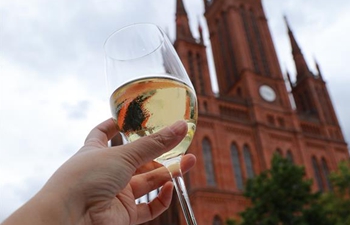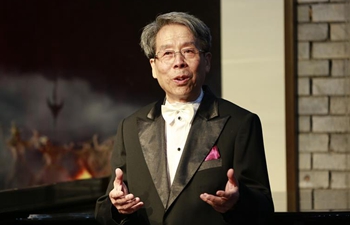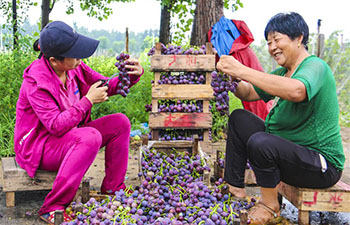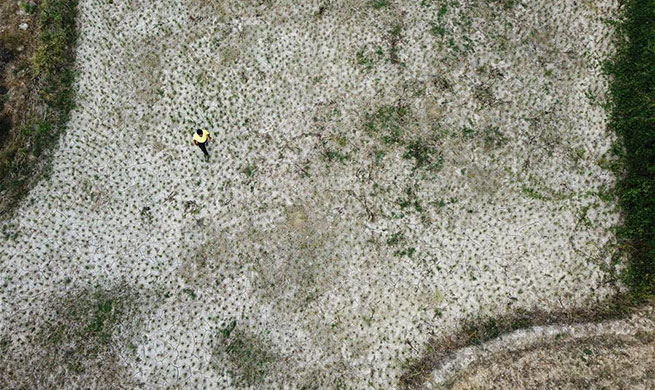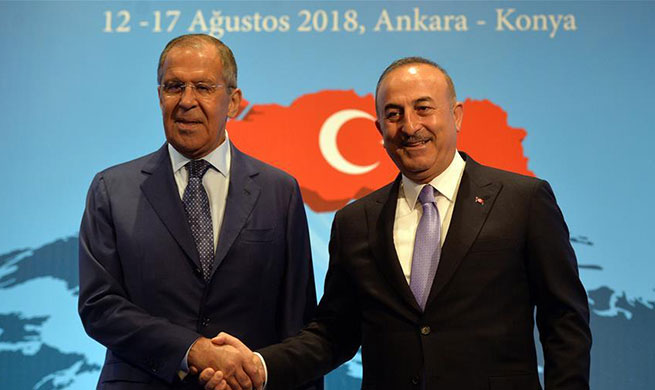ALBUQUERQUE, the United States, Aug. 14 (Xinhua) -- Ray Tokuda, a 54-year-old Japanese-American, is proud of the title his school has given him. He is a "shifu," a Chinese word literally meaning a master, mentor or senior practioner of martial arts.
Tokuda has reason to be proud. He has been involved with Chinese martial arts for almost four decades. After learning them at the martial arts school here in U.S. New Mexico State, today he is among the most experienced kungfu teachers of the school.
Founded by a Chinese American in 1974, the training center accepts only those with stunning kungfu skills and a profound understanding of martial arts as its masters, said Shanti Thomas, general manager of the school.
Practicing martial arts two to three hours and helping students improve their skills have become Tokuda's daily routine. He expects to practice and teach martial arts for the rest of his life.
"I'm still learning ...it's worth more than a lifetime to learn Chinese martial arts," he said. "Once (I) started I just couldn't stop. I think it's also the magic of Chinese culture."
Tokuda's family moved to Albuquerque, the largest city in the state, from Vermont when he was 2 years old.
He was sent to the martial arts school when he was 10. He still remembers how unwilling he was when starting out.
"My father had always wanted to learn Chinese martial arts but never got the chance, so he put his kid in," he said. "I was so afraid at that time because I thought kungfu was all about sparring."
But things changed after he learned that martial arts were more than punching and kicking.
"One of the things martial arts teach you is overcoming adversity," Tokuda said. "As a little kid, my first lesson was like, oh, look, this is a thing that I can overcome by diligence, perseverance and dedication, and ... that was invaluable for my life."
Learning Chinese martial arts was an eye-opening experience also because he could hear a lot of ancient Chinese kungfu-related stories.
"It was like in America, (where) we hear stories about knights in shining armor and King Arthur and noble deeds done," he said.
To better understand the essence of martial arts, Tokuda attended a China tour organized by his school in 2002. He described it as a martial arts pilgrimage.
"We went to Shaolin and Wudang and exchanged views and skills with kungfu masters there," he said, fired by excitement while talking about the experience.
The Shaolin temple in central China's Henan Province is a Buddhist monastery famed for its typical fighting style kungfu, while Wudang Mountain in central China's Hubei Province is known for its Taoist temples, where a different school of martial arts evolved.
Tokuda said he is teaching and learning at the same time now. He spends around 15 to 20 hours a week honing his skills and is also working on standardizing the tai chi curriculum for the training center. Tai chi is another Chinese martial art known for its defense training as well as health benefits.
"Aesthetically Chinese martial arts have a unique beauty," Tokuda said, "I personally find the complexity intriguing. To me there's more to (learn) than just fighting techniques."
The kungfu master said martial arts opened a gateway for him to better understand Chinese culture.
"I feel martial arts preserve something of ancient China that can't be found in books. They are sort of an oral history."
Tokuda has been invited to various events in Albuquerque to showcase traditional Chinese culture, including the dragon dance and lion dance, which he also learnt at the martial arts school.
"It was amazing when I could demonstrate Chinese culture as a foreigner," he said.
